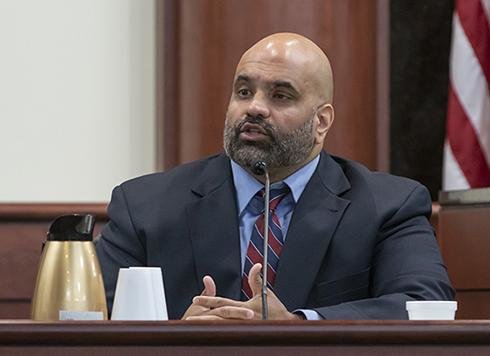Psychiatrist: Jones schizophrenic
Father on trial for killing his 5 children
markbellune@yahoo.com
A psychiatrist said Timothy Jones Jr. has schizophrenia and suffers from brain damage.
Jones is facing the death penalty if found guilty of murdering his 5 children — Merah, 8; Elias, 7; …
This item is available in full to subscribers.
Subscribe to continue reading. Already a subscriber? Sign in
Get 50% of all subscriptions for a limited time. Subscribe today.
Please log in to continueNeed an account?
|
Psychiatrist: Jones schizophrenic
Father on trial for killing his 5 children
markbellune@yahoo.com
A psychiatrist said Timothy Jones Jr. has schizophrenia and suffers from brain damage.
Jones is facing the death penalty if found guilty of murdering his 5 children — Merah, 8; Elias, 7; Nahtahn, 6; Gabriel, 2 and Elaine, 1 — in their Red Bank home on Aug. 28, 2014.
He has pleaded not guilty by reason of insanity.
If the Lexington County jury believes Jones has schizophrenia, they could find him insane and avoid a death sentence.
Thursday, the prosecution countered that a defense psychologist testified Jones did not show any signs of schizophrenia.
Under cross examination, the psychologist said Jones’ disorganized thought “seemed to be appropriate to the time and place” of his divorce.
Testimony will continue Friday at the Marc H. Westbrook Judicial Center in downtown Lexington.
Dr. Bhushan Agharkar, an Atlanta forensic psychiatrist, testified Jones suffers from schizophrenia and brain damage.
The damage occurred when part of Jones’ skull was caved in a car crash when he was 15.
Agharkar said Jones’ mother and grandmother had schizophrenia and other family members had mental health problems.
This raised Jones’ chances of developing the disease, he said.
In interviews lasting about 3.5 hours, Jones told Agharkar that he began hearing voices at age 10.
Jones said he then turned to substance abuse at age 12.
The voices at 10 told him to kill himself and “that really scared him,” Agharkar said.
Jones probably hid his symptoms due to his high intelligence and education, Agharkar said.
“There is no barrier to schizophrenia,” he said. “You can be very smart and still schizophrenic.”
“He (Jones) said he took drugs and alcohol to calm the voices.”
After 4.5 years on anti-psychotic drugs awaiting trial, Jones showed his disease was not drug-induced, Agharkar said.
“He’s not faking this,” he said.
With the prescribed drugs in jail, Jones told Agharkar the voices “are almost completely eliminated.”
On cross examination, Agharkar admitted his diagnosis was for the time he saw Jones in jail and not the night of the 2014 murders.
The defense has already introduced boxes of the anti-smoking drug Chantix into evidence.
Agharkar said the drug could cause neuro-psychotic episodes including anxiety and suicide.
Jones has said he used the drug Spice, or synthetic marijuana, for 3 months before the killings.
Agharkar said Jones told him the drug calmed the voices in his head.
Agharkar said the drug can lead to psychotic episodes or can aggravate a psychotic condition.
Using a prescribed drug to explain Jones’ actions verses voluntarily taking an illegal drug may distinguish whether Jones can be held legally accountable for psychotic behavior.
Agharkar has been paid more than $25,000 by the state’s indigent defense fund at a discounted rate of $400 per hour, he said.
Dr. April Hames, a psychologist of marriage and family therapy, was called by the defense and testified Jones suffered from moderate depression.
Jones went to Hames alone to try to save his marriage, she said.
“Due to childhood issues, I feel I am carrying baggage that is affecting my marriage,” he said in their first meeting in 2012.
Jones and his wife Amber were divorced in 2013.
“I got a monster inside me and now it’s gotten out,” Hames said he told her.
He was fearful his wife was being unfaithful.
He said the monster would talk to him, but Hames felt he was externalizing issues with his mother, her schizophrenia and previous infidelities.
He told her he returned home early from a trip to see his parents in Mississippi to find Amber in their home with another man.
That’s when he went back to drinking and smoking heavily, Hames said.
After that incident, Hames wrote another physician asking to prescribe Jones an anti-anxiety medication.
Jones was unemotional Thursday except for seeming to be crying when Hames described his children.
“Elias was my little buddy,” she said Jones told her.
Jones said the “monster was gone” in 2013 because he had “cried it out” in church, she said.
To the objections of the defense, prosecutor Shawn Graham had Hames qualified an expert on diagnosing schizophrenia.
Graham asked Hames if Jones ever presented any signs of delusions or hallucinations which she said he did not.
The only sign of schizophrenia was disorganized thought, she said, which she attributed to his divorce.
Defense attorney Boyd Young asked if it was possible to mask the symptoms of schizophrenia.
Hames replied, “to a certain extent.”
Prosecutor Graham asked if it was possible to fake it.
Hames replied “Yes.”
Jones’ former Pentecostal pastor Micah Sutton testified the defendant told him there was “a monster inside me trying to get out and I don’t know what to do about it.”
He said speaking and praying “in tongues” helped calm him.
Jones sought a leadership role in the small church outside Chicago in 2003, but Sutton didn’t think he was suited for it.
Sutton said Jones also “thought my wife was trying to seduce him.”
“The idea of her trying to seduce him is unfathomable.”
Keywords
tim jones murder trial, Lexington CountyOther items that may interest you







Comments
No comments on this item Please log in to comment by clicking here